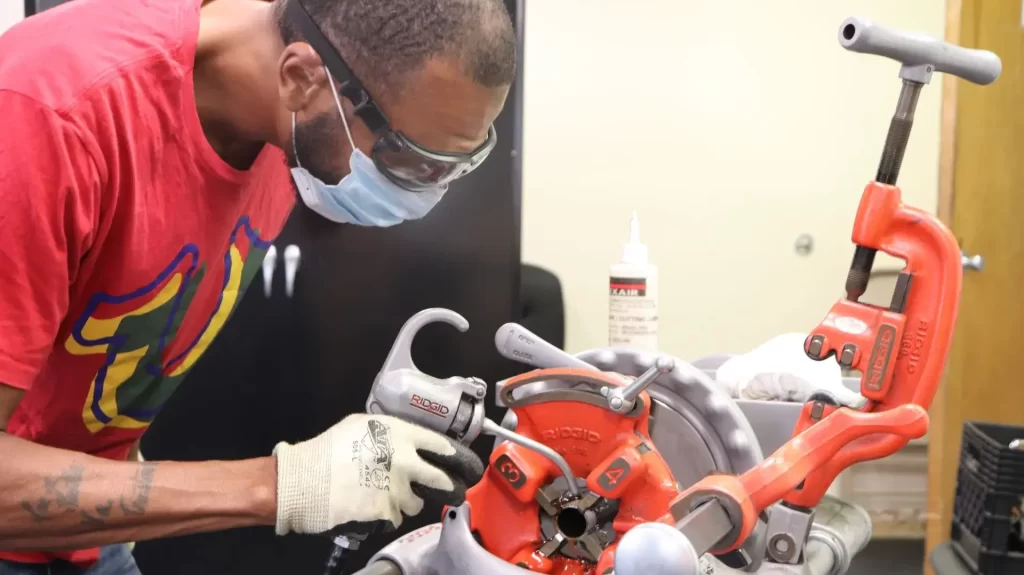The most common plumbing problems are blocked empties and toilets, leaking faucets and piping systems, water heater issues, and low-water force. Some of the solutions to these problems are usually taught at accredited plumber schools. These plumber schools offer courses that may take around two years to cover all plumbing work practices.
Pipe fitting occasionally involves occupational hazards, particularly in instances of high-altitude fixtures and replacements. In addition, pipes and tubes are utilized to move materials that are harmful or pose health threats. This might be another instance where a professional pipefitter might have to apply practical knowledge to ensure safety.
Pipe fitting is one of the most common trade skills today. Learning plumbing through proper trade schools helps you kickstart your career journey. Apart from that, pipefitters in developed countries offer their clients many service options for the nation’s overall development.
Plumbing problems can be relatively minor and inexpensive. But more severe issues, like sewer system backups, can be disastrous if not tackled immediately. Therefore, plumbing training programs help you to get skilled. Thus, you can now avoid damages to walls, floors, and overall personal property and ensure the efficiency of the work done!
Some of the ordinary day to day plumbing problems that generally occur in every home’s plumbing systems are:
A dripping tap occurs when the washer that seals the faucet gets damaged. Damage might include ripping, dislodging, or stiffening. If this situation occurs, the washer will no longer seal tightly, enabling smaller amounts of liquid to trickle from the faucet.
Frequent use from regular usage is quite hard to prevent. In the long run, dripping faucets are bound to occur. You can avoid such problems by switching the faucets. Pipefitting training centers can be a boon if you learn from them.
Leaky pipelines can be hard to prevent, but you can inspect the difficulty early with regular inspection. First, ensure that the moisture content is little in your washroom. Noticeable rusting can signal the potential for dripping.
The problem usually comes whenever something apart from dissolvable waste enters the bathroom and gets flushed. Then, those solid items cannot undertake the pipeline, and it is hard for the liquid to move beyond the blockage and down the pipelines.
Start with a plunger to help eliminate the clog. A plunger works on commodes as well as empties. An easy plumbing tool helps loosen clogs. Then, from the strain, if you’re able to draw the blockage with tweezers or pliers, seize the clump and remove it.
You can learn to prevent toilet blockages in accredited plumber schools. Make sure to supervise children so that they don’t flush toys or other things in the commode. If anything falls inside the toilet, you should remove it instead of trying to flush it.
Low water pressure includes a few causes being possible. A liquid primary break can reduce pressure on your tap – this may be the matter if your neighbors experience water pressure problems. The loss is undoubtedly the same if your pipeline is leaking inside your house. Shut all taps off, check your liquid meter and wait a few hours without using any water to check for leakages.
You can learn all the necessary precautions at specialized plumber schools. If you think build-up could be the problem, begin with the aerators or showerheads where you possess liquid pressure dilemmas. Unscrew the end of the faucet tap for cleansing. Immerse the aerator in vinegar overnight to loosen the build-up.
If you can’t take away the aerator or showerhead, put vinegar in a plastic bag. Use a filtration system to keep minerals away from the pipelines and prevent build-up. Regular inspection is recommended.
A toilet that is constantly running takes place when the lavatory’s internal functions no longer work correctly. For example, the flapper device often lets water operate if it is damaged. Various other potential factors include unbalanced float, free fill tube, as well as a drip. Check each component to get the specific problem.
Make sure the slim and versatile tube within the tank remains connected and directed towards the overflow tube. Adjust the float to guarantee the fill device shuts off precisely. Check the chain connected to the flapper and ensure it isn’t tangled. If easy adjustments don’t work, replacing all the internal tanks may be required.
This problem might not occur until the water suddenly goes cold during your shower. Several problems can cause a water heater to fail. The pilot light might head out, and you may have to relight it. A build-up of sediment could also cause such problems. When you learn plumbing at trade schools, you instantly learn to deal with various problems.
Apart from that, it might also be the thermoregulator that poses such problems. Generally, you would want an expert to examine, repair, and install your water heater.

Plumbing problems are messy to handle, and particular operations can be executed by trained professionals only. While some people may have little knowledge of the basics, no amateur can compete with the expertise of an experienced and skilled technician. Therefore, plumbing apprenticeships can be beneficial to learn all about plumbing issues.
If you want to learn professional plumbing skills, several plumbing trade schools at Haddonfield, NJ, Northeast Philadelphia, South West Philadelphia, and Allegheny West can help! A master plumber can provide much-needed pipefitting assistance by industrial technicians, including diagnosis, inspection, clearing clogged drains, fixing leaking pipes, and general repairs.
Read More: